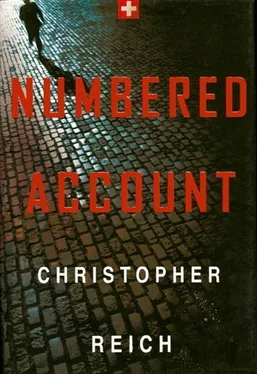“Veuillez entrer. Do come in, please,” the slim man beckoned. “Monsieur…”
“Malvinas. Allen Malvinas. Bonjour.” The Pasha extended his hand. He detested speaking French.
“Yves-Andre Wenker. Swiss Passport Office.” Wenker pointed the way toward an expansive sitting area. “You’re alone? I was told you would be accompanied by a Mr. Neumann, an assistant to Herr Kaiser.”
“Alas, Mr. Neumann could not join us. He was taken ill quite suddenly.”
Wenker frowned. “Is that so? To be frank, I was beginning to doubt whether you would arrive at all. I expect my clients to respect our scheduled meeting times regardless of the weather. Even if they are referred to me by so eminent a businessman as Herr Kaiser.”
“Rain, sleet, poor visibility. We had a long ride from Zurich.”
Wenker eyed him skeptically, then showed him into the sitting room. “Herr Kaiser informs me you are a native of Argentina.”
“Buenos Aires.” Mevlevi eyed him uncomfortably. There was something vaguely familiar about this man. “Do you by any chance speak English?”
“I am sorry, but no,” Wenker replied, inclining his head deferentially. “I favor only the Romance languages of the European continent. French, Italian, a little Spanish. English is such a vulgar language.”
Mevlevi said nothing. He knew the voice, he was sure of it, but its provenance eluded him.
“Eh bien. Shall we get down to business?” Wenker checked his watch and sat down on the sofa. He had laid out a succession of manila folders on the coffee table in front of him. Tabs indicated their contents as “Work History,” “Residence,” and “Financial Information.” “The usual application process requires seven years provided proof of Swiss residence has been established. As we’re hastening the process, quite a few documents will have to be filled out during our meeting. Please try to be patient.”
Mevlevi nodded, though he was hardly listening. His thoughts were an hour behind him, stranded atop the misty mountaintop. He had hit Neumann with at least one of the shots. He had heard the boy cry and fall down. Why, then, hadn’t he gone after him? Had he been surprised that the boy had put up a little resistance? Not at all like his father, who had stood as if hypnotized, staring into the barrel of the gun. Had he been scared that somewhere in the blanket of mist he might find Neumann all too alive, and not like what the boy had in mind for him? Neumann was, after all, a marine. Where else did one learn to chop off a man’s arm with a single blow? Not that the chauffeur would need it any longer. He’d had to put him out of his misery. Bastard should be thankful. Didn’t feel a thing. Slug to the back of the neck. Bang, it’s over.
“Have you brought three photographs with you?” Wenker asked again.
“Of course.” Mevlevi reached into his briefcase and withdrew his passport and a wax paper envelope holding three small portraits.
Wenker examined them quickly. “You must sign the back of each one.”
Mevlevi hesitated, then bowed to the man’s demands. The damned Swiss—punctilious to a fault, even in their most corrupt dealings.
Wenker accepted the signed photos and placed them in an open folder. “May we begin with the questions?”
“Please,” the Pasha answered gallantly. He turned his head to look out at the lake. The view of dappled palms swaying in the morning breeze did little to dispel the unease chewing at his stomach. He could not relax until he had word about Neumann.
* * *
Thirty kilometers south of Lugano, a tangled braid of traffic slowed to a crawl as it neared the southernmost Swiss border at Chiasso. The border crossing was considered the country’s busiest, one of only three portals through which the industrial output of northern Italy could reach the mighty economies of Germany and France. Trucks of every size, shape, and vintage traversed the flat stretch of superhighway. Among their number this morning was an eighteen-wheel Magirus rig bravely hauling two trailers. Her cab was painted a royal blue. Her chrome grille sported a white badge with the letters TIR. Trans Internationale Routier.
Joseph Habib sat inside the truck’s cabin, wedged uncomfortably between two mafiosi, low-level thugs who worked the Italian side of things for the Makdisi family. Eighteen months he’d been under. Eighteen months since he’d tasted his mother’s spicy mezza. Just a few more minutes, keep these hotheads calm until the rig pulls into the checkpoint, and it would go down like clockwork. He only wished he could be there to see Ali Mevlevi’s face when he learned he’d lost his shipment.
The portico came into view a few hundred yards ahead. Traffic was stop-and-go.
“I told you to pull into the right lane,” Joseph said to Remo, the driver. “Do as I say.”
“It’s backed up halfway to Milano. You want I should take that lane, we never get to Zurich.” Remo was a young tough, black hair pulled into a ponytail, shirtsleeves rolled up to show off his chiseled biceps.
Joseph turned his shoulders toward him. “I’ll tell you one more time. The right lane or we turn around and go home. Why do you insist on disobeying Mr. Makdisi’s orders?”
The traffic stopped. Remo lit a cigarette. “What does he know about crossing this border?” he asked, blowing smoke into the cramped cabin. “I’ve done it a thousand times. No one has ever given us a second look.”
Joseph shifted his gaze to the slovenly man in the passenger seat. “Franco, tell your friend. We go to the right or we go home.” He knew Franco was scared of him. The unkempt slob was always looking over at him, his eyes practically swallowing the scar on his cheek. You could see the man shudder, wondering how he had gotten it.
Franco leaned across Joseph and tapped the driver on the arm. “Remo. Right lane. Pronto.”
“How much time?” asked Remo.
“Twenty minutes,” said Joseph. “No problem. Our man doesn’t leave the booth until ten-thirty.”
“What’s taking so long this morning?” Remo asked, tapping the giant steering wheel impatiently. “Take a look.”
Franco reached for a leather case holding a pair of binoculars that sat on the floor. He grunted. The girth of his stomach prevented him from reaching it. He smiled at Joseph. “Per favore.”
Joseph unlatched the box and handed him the field glasses. This was crunch time. Stay calm and the others will stay calm, too.
Franco rolled down the passenger window. He labored to place his head and shoulders outside the cab of the eighteen-wheeler.
Remo sucked on his cigarette. “Eh?” he inquired loudly.
“Only two lanes open,” answered Franco, after pulling his body inside the cabin.
Remo tapped his forehead. “Two lanes. This explains why we go so slow.”
“Which one is closed?” asked Joseph coldly. Say it’s the left one. Keep everything according to plan.
“The left one,” said Franco. “Everybody is being funneled into the center and right lane.”
Joseph exhaled.
Remo blasted his horn and drew the big rig into the right lane.
* * *
Thirty meters behind the juggernaut, an undistinguished white Volvo turned on its blinker and followed suit. The driver played with a small gold medallion hanging from his neck. “Almost there,” Moammar al Khan whispered, bringing the medallion to his mouth and kissing it lightly. “Inshallah, God is great.”
* * *
“Your name?” asked Yves-Andre Wenker. He sat primly on the couch, forms splayed across his lap.
“Allen Malvinas. Must I introduce myself twice? The essentials are there, in my passport. You have it on the table.”
Wenker eyed the travel document resting on the coffee table. “Thank you, Mr. Malvinas. However, I prefer a personal response. Date of birth?”
Читать дальше












